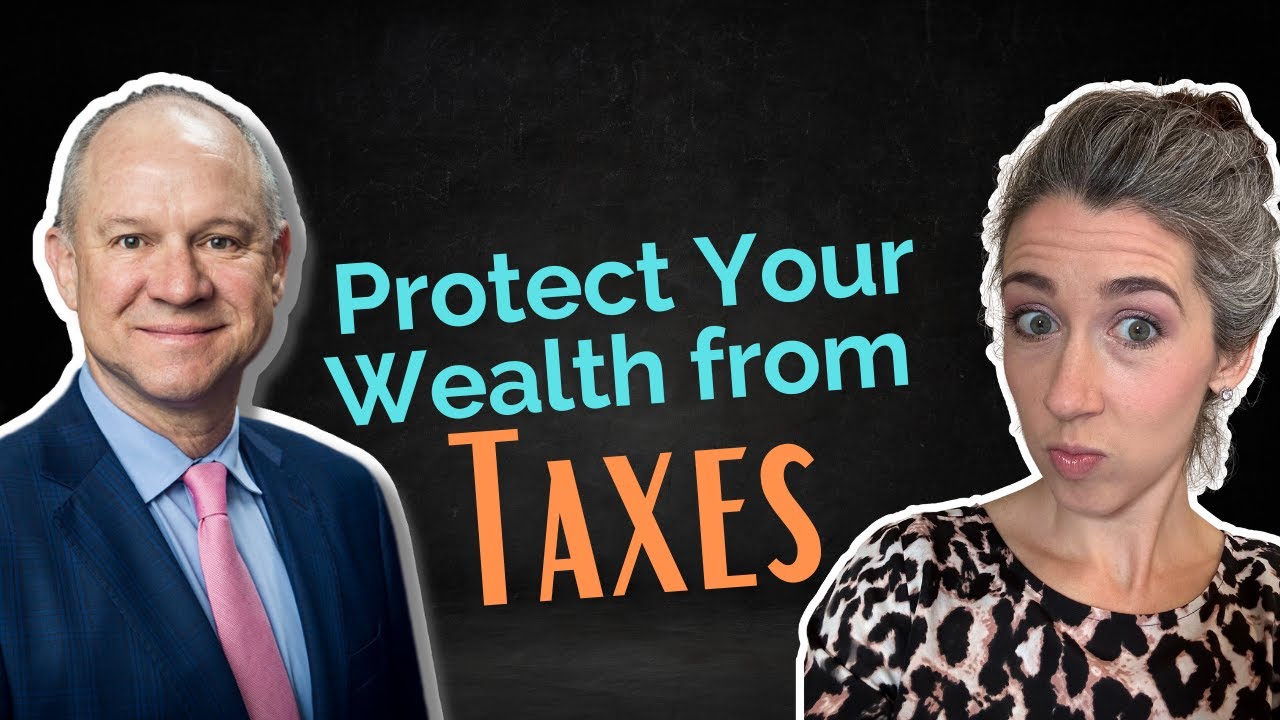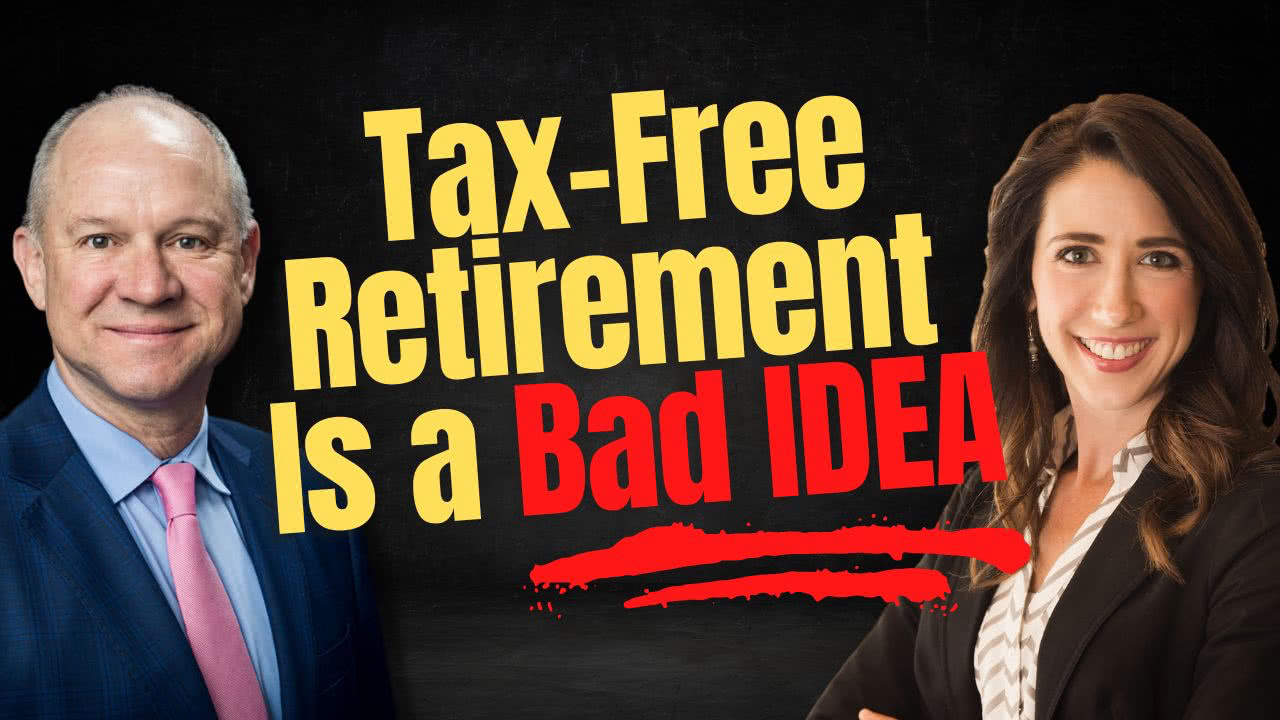
How to Pay Less Tax
Concerned about taxes in the future? Taxes are a huge eroder of wealth. While you do not have control over tax rates, you can strategically position yourself to maintain control of as much of your money as possible. Taxes are at a historic low, so it is time to learn how to pay less tax legally.
So, if you want to find out how to protect your wealth from likely tax rate hikes and minimize your tax rate … tune in now!
*Disclaimer: This is not tax advice.
Podcast: Play in new window | Download (Duration: 51:58 — 59.5MB)
Subscribe: Apple Podcasts | Spotify | Android | Pandora | RSS | More
Table of contents
Taxes Are Paid on the Margin
A common misconception about taxation is that your tax bracket is the percentage of tax you pay for your entire ordinary income. In reality, everyone is taxed the same way, on the same dollars. Income is taxed on the margin. So for married couples, everyone’s first $20,550 is taxed the same exact way, at 10%. The next margin is taxed at 12%. So everyone’s income from $20,551 to $83,000 is taxed at 12%. Any income you make past $83k is taxed at the next bracket, which is 22%. The highest bracket is 37%.
You may be able to reduce your taxable income through deductions, and that comes off the top. So if you make $100,000 in a year, only 10,550 of those dollars are being taxed at 22%. If you can reduce your taxable income by $10,000 then only $550 gets taxed at 22%.
In other words, just because you’re in the 22% tax bracket does not mean that 22% of your income is going to taxes. It represents which margin you’re in. This also means that everyone is being taxed the same on the same dollars. If you reduce your taxable income, you’re not being taxed unfairly because you’re still being taxed in the same way as everyone else.
It’s also important to note that the above pertains to ordinary income, which is W-2 income and many investments. Capital gains—income from the sale of investments—have a different tax structure.
Reducing Your Taxable Income
[7:13] “Your taxable income is all your [ordinary income], minus your deductions, which is either because you itemize… or the standard deduction. And then if you own a business, you also get what’s called a qualified business deduction. And then you come up with the taxable income after that.”
The standard deduction is $12,950 if you’re single, and $25,900 if you’re married and filing jointly. If your own a business it is worth itemizing your expenses and seeing if they exceed the standard deduction, to get the most benefit with your taxable income.
It’s also wise to be mindful of how you access different accounts that you own. Many people love their tax-deferred 401k because they can defer paying taxes on their contributions. They see this as a tax credit when really it just means you don’t have to pay taxes yet. But if you need access to those dollars, you can bet you’ll be paying income tax. That’s why it’s powerful to have other sources of liquid cash that won’t increase your taxable income. A policy loan from your whole life insurance or a Roth IRA, for example.
Active Tax Planning
By 2026, the tax brackets will shift in a way that may necessitate some active tax planning. This means working with your trusted tax advisor to come up with a plan. The reason is that in 2026, the 22% margin will return to 25%. The top threshold of the margin is also decreasing from $178,000 to $153,000.
What this means is that if your income is around $153,000 to $178,000, you could make less money in 2026 and still be in a higher tax bracket. This also means that any money you make from $83,550 to $153,000 will be taxed at 25% instead of 22%.
If you are close to that upper threshold, work with a trusted tax advisor to reduce your taxable income. And if you have tax-deferred assets, you think you’ll want to access or liquidate; doing it now could save you money. You’ll still have to pay taxes, but you’ll pay them at a more favorable rate now than you will later.
Even if you think you may leave your money in tax-deferred accounts for estate planning purposes, it may not be exactly what you think. Under current tax law, assets passed to the next generation must be withdrawn over 10 years, not a lifetime. This might bump heirs into higher tax brackets, during what could be their peak earning years is they are in their 30s and 40s.
What is Tax Deferral?
[19:53] “Tax deferral sounds fancy, right? It sounds like I’m avoiding a tax that I should be paying. It kind of sounds like grace, like I deserve to pay this but somehow I’m getting a free ride or a pass. Deferral, if we really just break down the word, means to postpone. And it’s better and more logical to think about taxes from that perspective. If I defer a tax, that doesn’t mean I’m not paying it, or I’m getting a free pass. It literally means I’m postponing it. Which means on that portion of income I’m not paying today, but I will pay in the future.”
The unfortunate risk of tax deferral is that it’s a guessing game. Not only can you not know what the tax rates will be when you need or want that money, but you also can’t know what your income will be. Even if the tax rates don’t increase, your income could be much larger and accessing that money if you need it could push you over a threshold.
As we mentioned, you might choose to pay taxes now in favor of paying more later. Sometimes paying more tax can be beneficial in the long run. It all depends on your personal economy, your morals, and the purpose you have for your money. Therefore, it’s important to work with a specialist who can help you implement the right strategies for you.
Whole life insurance cash value is tax-deferred, however, you have the option to access it tax-free through policy loans. This is why we call it tax-advantaged—because you have the option to experience your cash value as if it were tax-free, however, it is a tax-deferred product.
Are There Tax “Loopholes”?
One way to decrease your taxable income is by doing things that the government wants you to do. These are often, incorrectly, referred to as tax “loopholes.” However, the term loophole implies that there is something sneaky about these practices. In reality, they are tax incentives purposely written into the tax code because the government wants to encourage certain behaviors.
In exchange for engaging in practices or behaviors that the government wants you to do, you get to benefit from tax deductions. Through these strategies, you can reduce your taxable income significantly. For example, there’s an interest deduction on mortgages because the government wants to encourage homeownership.
For business owners, there are usually tax incentives for providing housing. The more landlords can provide housing, the less the government has to do it itself. There are many other investments that the government incentivizes through deductions.
Book A Strategy Call
Do you want to coordinate your finances so that everything works together to improve your life today, accelerate time and money freedom, and leave the greatest legacy? We can help! Book an Introductory Call with our team today https://themoneyadvantage.com/calendar/, and find out how Privatized Banking, alternative investments, or cash flow strategies can help you accomplish your goals better and faster. That being said, if you want to find out more about how Privatized Banking gives you the most safety, liquidity, and growth… plus boosts your investment returns, and guarantees a legacy, go to https://privatizedbankingsecrets.com/freeguide to learn more.
Tax-Free Retirement is a Bad Idea
Want tax-free retirement income? Tax-free money in retirement sounds amazing… at first glance. But before you dive into this strategy, there are three things you need to know about why “Tax-Free Retirement” is a really bad idea. To find out exactly why you shouldn’t set up your financial game plan for tax-free retirement… tune in…
Read MoreThe Secure Act: Important Changes to Your IRA that You Need to Know
If you’re planning to leave an inheritance to your children, there’s a new rule in the Secure Act that will probably cause your kids to pay more taxes if you pass on your retirement plan. Today, we’re discussing how the Secure Act, passed in 2019, affects your retirement plans and may front-load taxes to kids…
Read More


